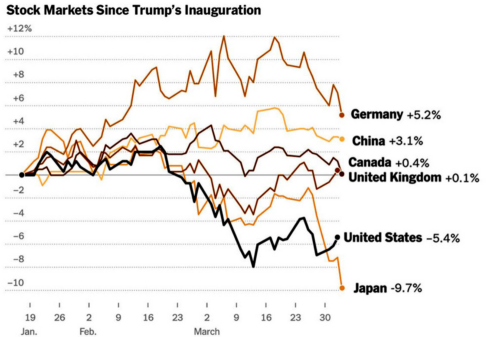Minister of State for Finance – Hon Chris Coye
by William Ysaguirre (Freelance Writer)
BELIZE CITY, Thurs. Apr. 3, 2025
The 10 percent tax on Belize’s exports to the United States, which President Trump imposed on what he dubbed “Liberation Day”, April 2, to penalize countries with which the U.S has a trade deficit, is incongruous, because the U.S. has no trade deficit with Belize! It may also drive up Belize’s inflation rate.
On the contrary, the U.S. had enjoyed a considerable trade surplus with Belize; the United States exported USD$633 million to Belize, while Belize’s exports to the U.S. in 2023 were valued at USD$86.2 million. The United States is Belize’s biggest trading partner, and Belize imports almost 8 times the value of the products Belize exports to the U.S. In 2023, Belize sold the United States $20.4 million worth of petroleum products, $18.6 million in molasses and $11.1 million in raw sugar. By comparison, the U.S. sold Belize $155 million worth of fuel and lubricants, $20.4 million worth of cars, and $11.7 million of packaged medicines in 2023. Belize’s imports from the United States over the last 5 years have been growing at 8.31 percent per year, from USD$425 million in 2018.

The formula developed by Trump’s economic advisors was to take the trade deficit that the US has with any particular country, and divide that by the value of total imports from that country, and then halve that value. In the case of China, the trade deficit is $295 billion, while total imports from China are valued at $440 billion. The fraction of 295/440 is 67 percent, and half that is 34 percent, which is the tariff Trump has imposed on China. But, since the US trade deficit with Belize is less than zero, by the same formula, Belize’s exports to the U.S. should be exempt from this trade war. By the same formula, the numbers from the U.S. Treasury say the US trade deficit with the European Union is $235.6 billion, which divided by the U.S’s imports from the EU – $605.8 billion, yields 0.388 or 39 percent. This number halved is approximately 20 percent, which is the tariff that Trump has imposed on all EU imports.
Trump’s blanket 10 percent tariff on all imports is difficult to understand. The U.S. economy is built on interconnected global supply chains, as most American products are manufactured from imported materials, whether it is steel, semiconductors, fabrics, tools … the inputs are imported. So, a tax on imports drives up the price on all goods made in the United States, and ultimately drives up the cost of living for Americans and anyone living in the U.S. Trump’s taxes won’t punish China, but they will make life difficult for American companies, workers, and consumers. And because Belize buys so much from the U.S., there will be a trickle-down effect on all imports of U.S. products into Belize, even before these products pay Belize’s import duties and tariffs to enter the Belize market.
The trade war that the Trump administration began with Canada and Mexico on February 1 also has many questioning the President’s logic, as the 25 percent tariffs he tried to impose would totally demolish the Free Trade Agreement between the United States of America, the United Mexican States, and Canada (USMCA), which Trump himself implemented at the end of his last term in 2020, as an update to the North American Free Trade Agreement (NAFTA), which was proposed by President George W. Bush in 1994 and ratified during the Clinton administration.
The other immediate effect of Trump’s “Liberation Day” announcement was to send the stock markets plummeting, as Wall Street trading tumbled 5 percent, the worst fall in trading since the COVID pandemic of 2020. Similar drops in trading were seen in Europe and Asia, as investors’ confidence waned in the face of the anticipated repercussions of Trump’s tariffs. Investors are tightening their belts, battening down the hatches and preparing for a recession in the United States, and it is making Americans think twice about vacationing abroad.
The Government of Belize has been evaluating the impact on the Belizean economy, and the Ministries of Finance, Economic Development, Foreign Affairs and Foreign Trade, Central Bank and the Directorate of Trade held a joint meeting on Thursday to determine what Trump’s tariffs will mean for Belize, Minister of State for Finance, Hon. Chris Coye explained in a media interview. There is still a lot of uncertainty, as there are some exemptions, such as on petroleum fuels, and government officials are still working out how it will affect other Belizean exports such as sugar, molasses and marine products.
The inflationary effect on Belize’s imports from the U.S are also yet to be seen, Minister Coye noted. If the tariffs are reciprocal, the taxes may be reduced to zero. Belize also enjoys a fixed quota on sugar exports to the U.S., which will remain unchanged. Belize will also be consulting with its CARICOM trading partners to present a united front, when CARICOM addresses the new U.S. tariffs, Coye said. Belize’s exports to the U.S. are primarily commodity products like oil, sugar and molasses, which may be treated differently from manufactured products, which other CARICOM territories export to the U.S.
CARICOM Heads of Government are scheduled to meet to discuss the region’s unified position on Friday, April 4, with a follow-up technical meeting scheduled for April 9. The Ministry of Foreign Trade will be meeting with Belize’s principal exporters to hear their concerns, and what they are asking the government to advocate for on their behalf at these meetings.
Trump’s trade wars and tariffs have also had an effect on Americans’ desire to travel, as the tourism sector has noticed a decrease in U.S. travel numbers, but Coye hesitated to speculate on what will be the long-term impact of the new tariffs, if any, on Belize’s tourism sector. The tourism sector grew by 8 percent last year, and while the industry might not see the same growth this year, Coye said the Belize economy is robust, and he does not expect to see any contraction.
Trump’s 10 percent tax will have an inflationary effect on U.S. imports to Belize, predicted the vice president for commerce, Jody Williams of the Belize Chamber of Commerce and Industry. Where in the past Belize’s food products exported to the United States paid no tax under the Caribbean Basin Initiative, the new 10 percent tax will oblige U.S. importers of Belizean food products to either absorb the cost (unlikely) or pass on the added cost to U.S. consumers. By the same token, U.S. manufacturers who import packaging materials from outside the U.S. may add the cost to their products, which Belizean consumers will have to pay, if they buy these products from the U.S.

